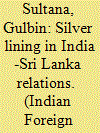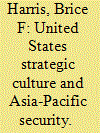| Srl | Item |
| 1 |
ID:
138301


|
|
|
|
|
| Summary/Abstract |
What determines the location of those human rights international non-governmental organization (INGO) resources found outside of the highly developed Western democracies? We draw a distinction between the bottom-up mobilization processes driving the location of human rights organization (HRO) members from the top-down strategic concerns driving where HRO leaders place permanent offices. In particular, we find that, while political opportunity structures generally increase the likelihood that a state has HRO members, it has a curvilinear influence on the number of HRO secretariats, which typically locate in areas seen as having a higher need for organizational resources. Further, while there is no clear connection between human rights abuses and HRO memberships in a state, HROs' strategic concerns lead them to place offices with reference to both local and neighborhood “need”—in other words, levels of repression.
|
|
|
|
|
|
|
|
|
|
|
|
|
|
|
|
| 2 |
ID:
139050


|
|
|
|
|
| Summary/Abstract |
With the election of Maithripala Sirisena as President of Sri Lanka, and the formation of the National Unity Government, it is expected that India’s southern neighbour will have a more democratic polity as compared to the earlier one. In addition, there is also a general popular expectation that, under the new government, there would be a greater balance in dealing with developmental issues in various constituent provinces of the island nation. There is also a general hope that there will be a thawing in the almost frozen India-Sri Lanka relationship. The Sirisena government is also likely to have a positive approach towards India, already indicated by the few initiatives that his government has taken. It will try to mend relations with India not necessarily by jettisoning its relations with China. A deft political calculation will be required by the Sirisena government on the issue of the implementation of the 13th Amendment, as it has the potential to cause a significant political loss by an upset Sinhala majority. The best way forward for Sri Lanka would be in following a middle path in its foreign policy, keeping in mind strategic concerns of an important neighbour like India.
|
|
|
|
|
|
|
|
|
|
|
|
|
|
|
|
| 3 |
ID:
132874


|
|
|
|
|
| Publication |
2014.
|
| Summary/Abstract |
This article adopts an historical socio-cultural lens to analyse the United States' strategic cultural tendencies. It traces the roots of the mutually constitutive relationship between technology and political structures in the United States to explain the dominant tendency of the United States to substitute technology for strategy in war as a predisposition of national strategic culture. This predisposition was seen particularly in network-centric warfare and effects-based operations. I conclude that the United States risks strategic failure due to the limitations of its ethnocentric security paradigm. Over-reliance on technology obscures strategic understanding of the people and cultures of the world, including those of the Asia-Pacific region. The development of the AirSea Battle is a case in point, a direct application of technology to strategic concerns in the Asia-Pacific region. The strategic pivot towards the Asia-Pacific may be characterized as reflecting more historical continuity than change in America's strategic calculus. The emerging Asia-Pacific security dynamic is no different a challenge for American policy-makers in that regard than challenges presented elsewhere in the world. Perhaps the biggest challenge for American leaders is to overcome institutional intransigence or the lure of ideological conformity when addressing military requirements and budgetary commitments.
|
|
|
|
|
|
|
|
|
|
|
|
|
|
|
|